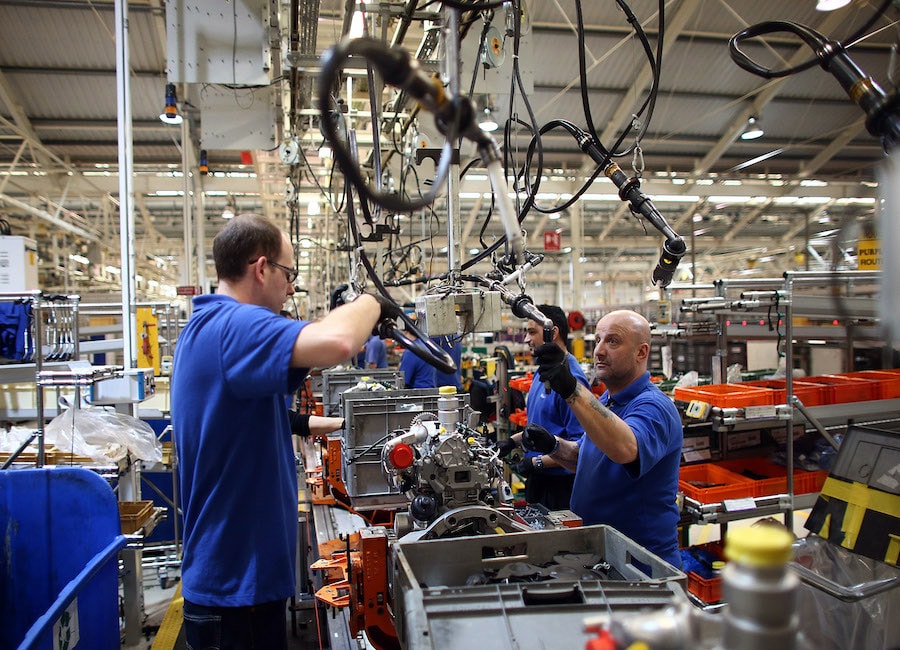New manufacturing orders fell for the fifth successive month amid persistently weak underlying demand in October, according to the latest AIB Ireland Manufacturing PMI.
Manufacturing output and employment both rose month-on-month, however, as firms made inroads into backlogs, the input prices rose at a strong overall rate - albeit the slowest in 20 months as weakening demand offset improving supply chains.
The PMI registered 51.4 in October, indicating a modest overall improvement in operating conditions in the goods-producing sector. The reading represented little change from September's 51.5 but was below the long-term average of 52.3.
"There was little change in the headline index in the AIB Irish Manufacturing PMI survey for October," said Oliver Mangan, chief economist at AIB. "The PMI remained within a narrow 51-52 range for a fourth consecutive month, with the index edging down to 51.4 from 51.5 in September.
"This signals a further modest improvement in business conditions in the sector. Much weaker readings are being seen in the rest of Europe, with the flash Manufacturing PMIs sinking deeper into contraction territory in October, at 46.6 in the Eurozone and 45.8 in the UK.
"However, there are some warning signals in the Irish data, with new orders, including export orders, declining for a fifth consecutive month as high inflation weighs on consumer demand, both at home and abroad.
"There was a slight increase in output as manufacturers continued to work to clear order backlogs and rebuild stocks of finished goods. As a result, firms were still hiring, with another solid increase in employment in the month."
In addition to output and employment, stocks of purchases also expanded last month, while supply delivery times lengthened further and new orders, the largest component of the PMI with a 30% weighting, remained negative.
The rate of reduction in new orders remained solid, with survey respondents reporting that customers had been deterred by high inflation, and new export orders fell at their quickest rate since June amid stagnant international demand.
The uptick in output reflected work to reduce outstanding contracts, with backlogs falling at their fastest rate since January 2021 and inventories of finished goods rising for the fourth consecutive month, but at a slower rate than in August and September.

The sustained drop in new work influenced firms' purchases of inputs in October, with a third decline in four months. In addition to lower demand, reduced buying activity reflected sufficient stock levels, which rose for the 19th consecutive month on the back of the arrival of previously ordered materials.
However, input inventories rose at the slowest rate over this sequence.
The lengthening of suppliers' delivery times was linked to staff shortages and high fuel costs as well as ongoing shortages of electronic components, although the increase in lead times was the second-smallest for the past 23 months.
Input price inflation eased for the fourth time in five months to a 20-month low, reflecting not only improved supply chains but weakening demand conditions, but output inflation edged up to a three-month high as firms passed on greater costs from materials, labour, fuel and energy.
The 12-month outlook improved to a seven-month high with anecdotal evidence linking positive expectations to export forecasts and hopes that the current downturn in demand will prove temporary.
"While suppliers’ delivery times continued to lengthen in October, there are signs of easing pressures on supply chains," Mangan added.
"Meanwhile, manufacturers cut their purchases of inputs for the third time in four months. In terms of the 12-month outlook, sentiment rose for the second month running, hitting a seven month high, though it remains below its long run average.
"Despite the weakening in demand, inflationary pressures remain strong. Input prices continued to rise sharply, with pressure on energy, fuel, materials and labour costs, though the rate of increase slowed further to a 20-month low.
"Output price inflation also remained elevated, edging up to a three-month high, as firms passed on higher costs to customers."
(Pic: Getty Images)









